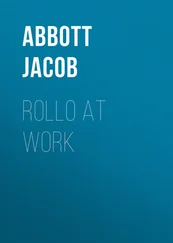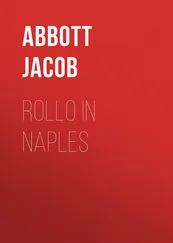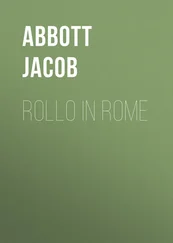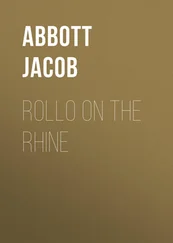Jacob Abbott - Rollo's Museum
Здесь есть возможность читать онлайн «Jacob Abbott - Rollo's Museum» — ознакомительный отрывок электронной книги совершенно бесплатно, а после прочтения отрывка купить полную версию. В некоторых случаях можно слушать аудио, скачать через торрент в формате fb2 и присутствует краткое содержание. Издательство: Иностранный паблик, Жанр: foreign_children, literature_19, foreign_antique, foreign_prose, на английском языке. Описание произведения, (предисловие) а так же отзывы посетителей доступны на портале библиотеки ЛибКат.
- Название:Rollo's Museum
- Автор:
- Издательство:Иностранный паблик
- Жанр:
- Год:неизвестен
- ISBN:нет данных
- Рейтинг книги:4 / 5. Голосов: 1
-
Избранное:Добавить в избранное
- Отзывы:
-
Ваша оценка:
- 80
- 1
- 2
- 3
- 4
- 5
Rollo's Museum: краткое содержание, описание и аннотация
Предлагаем к чтению аннотацию, описание, краткое содержание или предисловие (зависит от того, что написал сам автор книги «Rollo's Museum»). Если вы не нашли необходимую информацию о книге — напишите в комментариях, мы постараемся отыскать её.
Rollo's Museum — читать онлайн ознакомительный отрывок
Ниже представлен текст книги, разбитый по страницам. Система сохранения места последней прочитанной страницы, позволяет с удобством читать онлайн бесплатно книгу «Rollo's Museum», без необходимости каждый раз заново искать на чём Вы остановились. Поставьте закладку, и сможете в любой момент перейти на страницу, на которой закончили чтение.
Интервал:
Закладка:
Jacob Abbott
Rollo's Museum
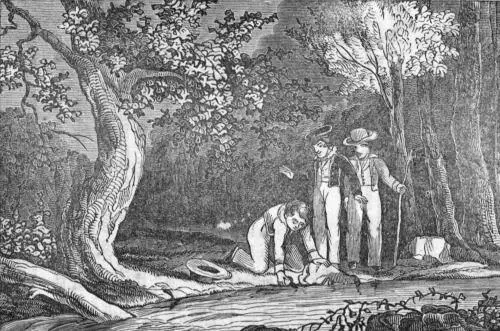
Henry made a sudden plunge after him. Page 119. Конец ознакомительного фрагмента. Текст предоставлен ООО «ЛитРес». Прочитайте эту книгу целиком, купив полную легальную версию на ЛитРес. Безопасно оплатить книгу можно банковской картой Visa, MasterCard, Maestro, со счета мобильного телефона, с платежного терминала, в салоне МТС или Связной, через PayPal, WebMoney, Яндекс.Деньги, QIWI Кошелек, бонусными картами или другим удобным Вам способом.
THE CANAL
It happened one summer, when Rollo was between seven and eight years of age, that there was a vacation at the school which he was attending at that time. The vacation commenced in the latter part of August, and was to continue for four or five weeks. Rollo had studied pretty hard at school, and he complained that his eyes ached sometimes.
The day before the vacation commenced, his father became somewhat uneasy about his eyes; and so he took him to a physician, to see what should be done for them. The physician asked Rollo a good many questions, all of which Rollo endeavored to answer as correctly as he could.
At length, the physician told Rollo’s father that all he needed was to let his eyes rest. “I think he had better not use them at all,” said he, “for reading or writing, for several weeks; and not to be out much in the hot sun.”
Rollo felt very much rejoiced at hearing this prescription, though still he looked very sober; for he felt somewhat awed and restrained by being in the doctor’s office. There were a good many large books, in cases upon one side of the room; and strange, uncouth-looking pictures hanging up, which, so far as Rollo could see, did not look like any thing at all. Then there was an electric machine upon a stand in one corner, which he was afraid might in some way “shock” him; and some frightful-looking surgical instruments in a little case, which was open upon the table in the middle of the room.
In fact, Rollo was very glad to escape safely out of the doctor’s office; and he was, if possible, still more rejoiced that he had so light and easy a prescription. He had thought that, perhaps, the doctor would put something on his eyes, and bandage them up, so that he could not see at all; or else give him some black and bitter medicines to take every night and morning.
Instead of that, he said to himself, as he came out at the door, “I have only got to keep from studying, and that will be capital. I can play all the time. True, I can’t read any story books; but, then, I am willing to give the story books up, if I don’t have to study.”
Rollo had usually been obliged to read, or study, or write a little, even in vacations; for his mother said that boys could not be happy to play all the time. Rollo, however, thought that she was mistaken in this. It is true that she had sometimes allowed him to try the experiment for a day or two, and in such cases he had always, somehow or other, failed of having a pleasant time. But then he himself always attributed the failure to some particular difficulty or source of trouble, which happened to come up then, but which would not be likely to occur again.
In fact, in this opinion Rollo was partly correct. For it was true that each day, when he failed of enjoying himself, there was some peculiar reason for it, and exactly that reason would not be likely to exist another day. But then the difficulty with playing, or attempting to amuse one’s self all the time, is, that it produces such a state of mind, that almost any thing becomes a source of uneasiness or dissatisfaction; and something or other is likely to occur, or there will be something or other wanting, which makes the time pass very heavily along.
It is so with men as well as boys. Men sometimes are so situated that they have nothing to do but to try to amuse themselves. But these men are generally a very unhappy class. The poorest laborer, who toils all day at the hardest labor, is happier than they.
So that the physician’s prescription was, in reality, a far more disagreeable one than Rollo had imagined.
When Rollo reached home, he told his mother that he was not to have any thing more to do with books for a month.
“And you look as if you were glad of it,” said she, with a smile.
“Yes, mother, I am,” said Rollo, “rather glad.”
“And what do you expect to do with yourself all that time?” said she.
“O, I don’t know,” said Rollo. “Perhaps I shall help Jonas, a part of the time, about his work.”
“That will be a very good plan for a part of the time,” said his mother; “though he is doing pretty hard work just now.”
“What is he doing?”
“He is digging a little canal in the marsh, beyond the brook, to drain off the water.”
“O, I can dig,” said Rollo, “and I mean to go now and help him.”
This was about the middle of the forenoon; and Rollo, taking a piece of bread for a luncheon, and a little tin dipper, to get some water with, to drink, out of the brook, walked along towards the great gate which led to the lane behind his father’s house. It was a pleasant, green lane, and there were rows of raspberry-bushes on each side of it, along by the fences. Some years before, there had been no raspberries near the house; but one autumn, when Jonas had a good deal of ploughing to do down the lane, he ploughed up the ground by the fences in this lane, making one furrow every time he went up and down to his other work. Then in the spring he ploughed it again, and by this time the turf had rotted, and so the land had become mellow. Then Jonas went away with the wagon, one afternoon, about two miles, to a place where the raspberries were very abundant, and dug up a large number of them, and set them out along this lane, on both sides of it; and so, in a year or two, there was a great abundance of raspberries very near the house.
Rollo stopped to eat some raspberries as he walked along. He thought they would do exceedingly well with his bread, to give a little variety to his luncheon. After he had eaten as many as he wanted, he thought he would gather his dipper full for Jonas, as he was busy at work, and could not have time to gather any for himself.
He got his dipper full very quick, for the raspberries were thick and large. He thought it was an excellent plan for Jonas to plant the raspberry-bushes there; but then he thought it was a great deal of trouble to bring them all from so great a distance.
“I wonder,” said he to himself, as he sat upon a log, thinking of the subject, “why it would not have been just as well to plant raspberries themselves, instead of setting out the bushes. The raspberries must be the seeds. I mean to take some of these big ones, and try. I dare say they’ll grow.”
But then he reflected that the spring was planting time, and he knew very well that raspberries would not keep till spring; and so he determined to ask Jonas about it. He accordingly rose up from the log, and walked along, carrying his dipper, very carefully, in his hand.
At length, he reached the brook. There was a rude bridge over it made of two logs, placed side by side, and short boards nailed across them for a foot-way. It was only wide enough for persons to walk across. The cattle and teams always went across through the water, at a shallow place, just below the bridge.
Читать дальшеИнтервал:
Закладка:
Похожие книги на «Rollo's Museum»
Представляем Вашему вниманию похожие книги на «Rollo's Museum» списком для выбора. Мы отобрали схожую по названию и смыслу литературу в надежде предоставить читателям больше вариантов отыскать новые, интересные, ещё непрочитанные произведения.
Обсуждение, отзывы о книге «Rollo's Museum» и просто собственные мнения читателей. Оставьте ваши комментарии, напишите, что Вы думаете о произведении, его смысле или главных героях. Укажите что конкретно понравилось, а что нет, и почему Вы так считаете.
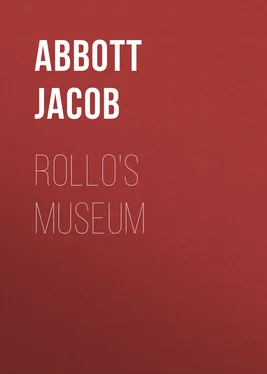

![Jacob Abbott - Rollo's Philosophy. [Air]](/books/717773/jacob-abbott-rollo-s-philosophy-air-thumb.webp)

